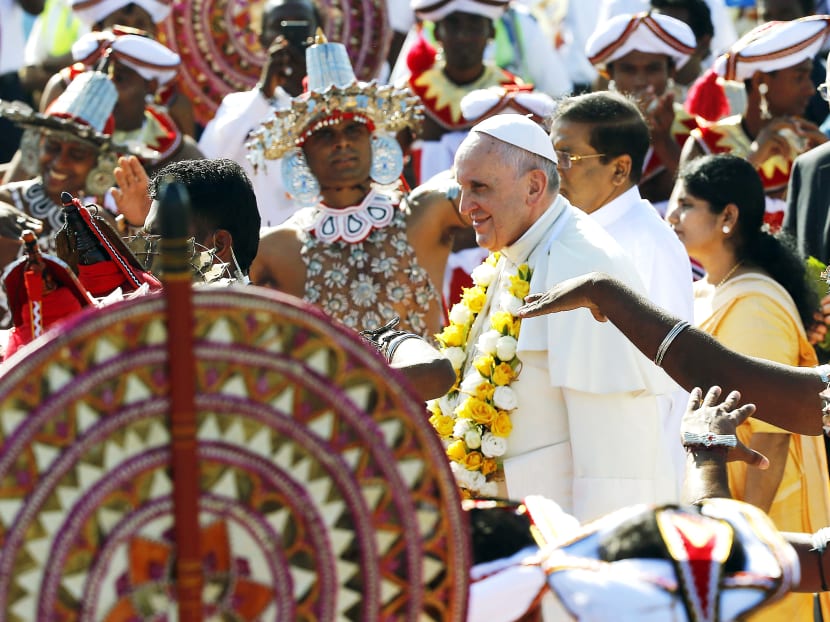Pope calls for reconciliation in Sri Lanka on first stop of Asia tour
COLOMBO — On his first Asian stop in Sri Lanka, Pope Francis called for reconciliation and justice, saying the island nation cannot fully heal from a quarter-century of ethnic civil war without pursuing the truth about abuses that were committed.

Pope Francis being greeted by traditional dancers as he arrived at Colombo airport yesterday. Photo: REUTERS
COLOMBO — On his first Asian stop in Sri Lanka, Pope Francis called for reconciliation and justice, saying the island nation cannot fully heal from a quarter-century of ethnic civil war without pursuing the truth about abuses that were committed.
In a show of ethnic coexistence, the Pope’s welcoming ceremony at Colombo airport yesterday featured traditional dancers and drummers from both majority Sinhalese and minority Tamil ethnic groups, as well as a children’s choir serenading him in both of Sri Lanka’s main languages as well as in Italian and in English.
With 40 elephants adorned in colourful costumes lining the airport road behind him, Pope Francis said finding true peace after so much bloodshed “can only be done by overcoming evil with good and by cultivating those virtues which foster reconciliation, solidarity and peace”.
He did not specifically mention Sri Lanka’s refusal to cooperate with a United Nations investigation into alleged war crimes committed in the final months of the war. But he said: “The process of healing also needs to include the pursuit of truth, not for the sake of opening old wounds, but rather as a necessary means of promoting justice, healing and unity.’’
Tamil rebels fought a 25-year civil war to demand an independent Tamil nation after decades of perceived discrimination by governments dominated by the Sinhalese majority. UN estimates said 80,000 to 100,000 people were killed during the course of the war, which ended in 2009; other reports suggested the toll could be much higher.
Sri Lanka’s new President, Mr Maithripala Sirisena, has promised to launch a domestic inquiry into wartime abuses, but he has also pledged to protect everyone who had contributed to the defeat of Tamil Tiger separatists from international legal action.
In his speech, the Pope said it was not enough for the government to build infrastructure and meet the material needs of Sri Lanka’s people. “The great work of rebuilding,” he said, “(must embrace) promoting human dignity, respect for human rights and the full inclusion of each member of society.”
The Pope will next travel to the Philippines, an Asian bastion of the Roman Catholic faith, where Pope-mania is officially in full swing. Filipinos have been snapping selfies beside life-sized cut-out images of him in churches and malls. His face beams from welcome posters, shirts, cookies, coins, stamps, coffee mugs and all imaginable mementoes.
Filipinos have welcomed Popes with rock-star intensity since 1970; the late John Paul II visited twice. Pope Francis’ Jan 15-to-19 trip, which follows his visit to Sri Lanka, promises to be as big or bigger, in part because the country has many painful reasons to look for hope. The leader of the Catholic world will visit eastern Leyte province, where Typhoon Haiyan killed thousands and levelled villages in November 2013. In addition, the pontiff’s focus on poverty, inequality and such social ills has resonated in this poor country of 100 million, where a tenth of the population work abroad to support their families back home.
“Filipinos are excited about the visit because people have a lot of problems and have been through a lot of calamities,” retired government employee Josephine Graza told AP in Manila. “They want to see the Pope so their heavy hearts can be relieved, so their problems can be bearable.” AGENCIES






